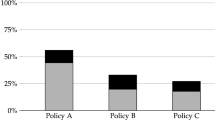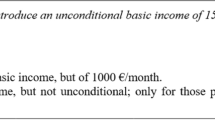Abstract
The expressive theory of voting needs more specification of the motives for expression if it is not merely to be a theory of non-instrumental voting. Brennan and Hamlin provide such a specification. Unfortunately, using individual U.S. data from the General Social Surveys we find their predictions are contradicted. Nor if other evidence in the literature purported to be evidence of expressive voting actually implied by it. We believe that this is because the reason people express themselves in voting is to signal others.
Similar content being viewed by others
References
Brennan, G. and Buchanan, J. (1984). Voter choice and the evaluation of political alternatives. American Behavioral Scientist 28: 185-201.
Brennan, G. and Hamlin, A. (1998). Expressive voting and electoral equilibrium. Public Choice 95: 149-175.
Brennan, G. and Lomasky, L. (1993). Democracy and decision. Cambridge: Cambridge University Press.
Carter, J. and Guerette, S., (1992). An experimental study of expressive voting. Public Choice 73: 251-260.
Fischer, A. (1996). A further experimental study of expressive voting. Public Choice 88: 171-184.
Glazer, A. (1987). A new theory of voting: Why vote when millions of others do. Theory and Decision 22: 257-270.
Glazer, A. (1992). An expressive voting theory of strikes. Economic Inquiry 30: 733-741.
Glazer, A. and Konrad, K. (1990). A signalling explanation for charity. American Economic Review 86: 1019-1028.
Greene, K. and Nikolaev, O. (1999). Voter participation and the redistributive state. Public Choice 98: 213-226.
Harbaugh, W. (1996). If people vote because they like to; then why do so many of them lie? Public Choice 89: 63-76.
Jones, P. and Hudson, J. (2000). Civic duty and expressive voting: Is virtue its own reward? Kyklos 53.
Kneuper, R. and Yandle, B. (1996). The air bag/seat belt controversy: How states voted. Eastern Economic Journal 22: 147-160.
Kuran, T. (1990). Private and public preferences. Economics and Philosophy 6: 1-26.
Nelson, P. (1994). Voting and imitative behavior. Economic Inquiry 82: 92-102.
Nelson, P. and Greene, K. (2002). Goodness without altruism: The economics and politics of moral behavior. University of Michigan Press.
Posner, E. (1998). Symbols, signals, and social norms in politics and the law. Journal of Legal Studies 27: 765-798.
Author information
Authors and Affiliations
Rights and permissions
About this article
Cite this article
Greene, K.V., Nelson, P.J. If Extremists Vote How do They Express Themselves? An Empirical Test of an Expressive Theory of Voting. Public Choice 113, 425–436 (2002). https://doi.org/10.1023/A:1020804704536
Issue Date:
DOI: https://doi.org/10.1023/A:1020804704536




